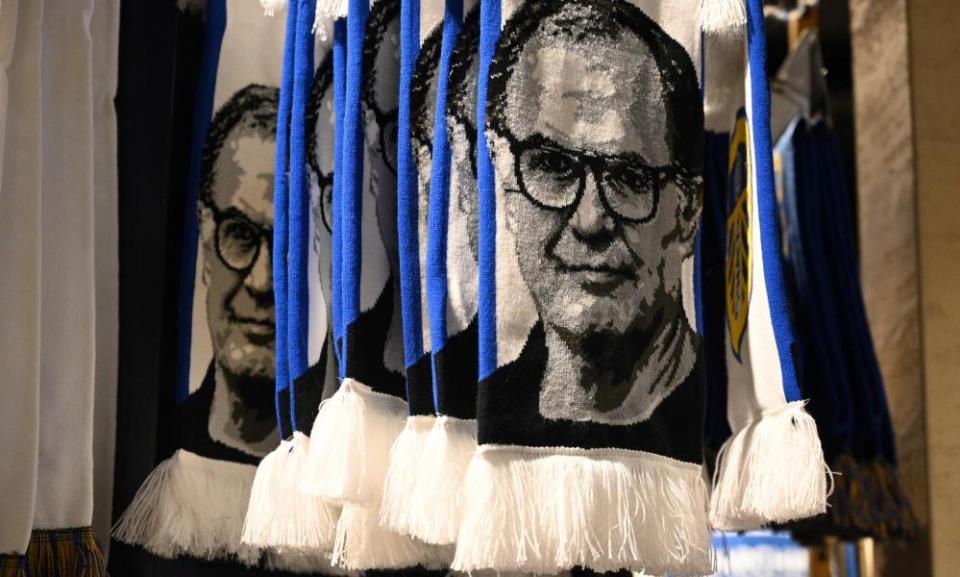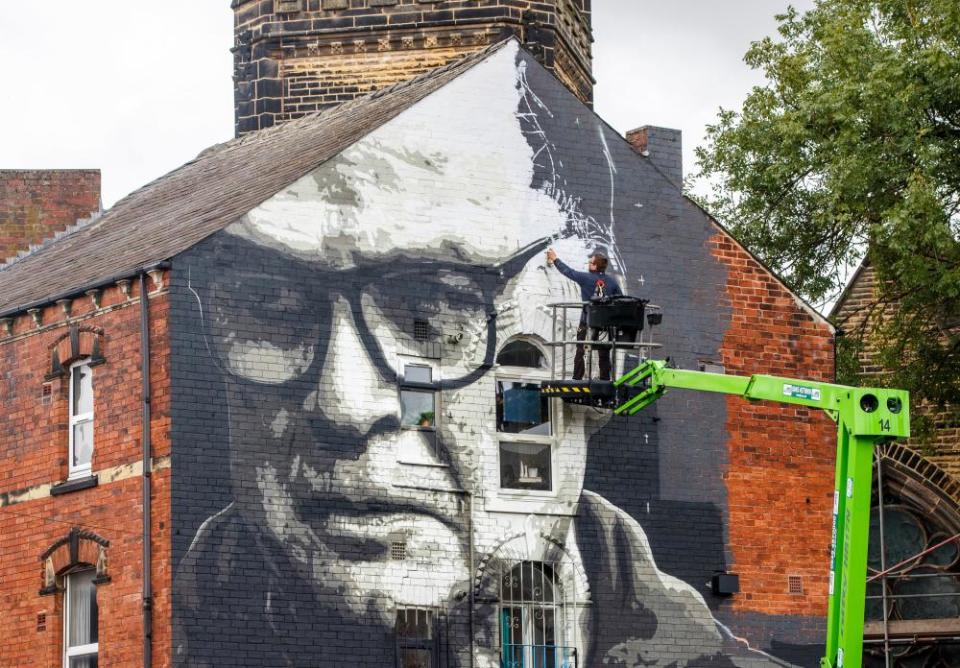Paint, pools and parking: inside the maverick mind of Marcelo Bielsa

There was consternation at Leeds council. Why had a painted blue line appeared on the streets of Wetherby, running from outside Marcelo Bielsa’s flat to Leeds’s Thorp Arch training ground? The call duly went into the club to ask the question and it is good fun imagining the reaction. “Blue paint? Ah, OK. Yes. Absolutely. Yes. Ridiculous. We’ll look into it. Yes. We know.”
Bielsa and one of his assistants, a wizened old guy from Chile, had been spotted walking the route with a trundle wheel and the video was uploaded to social media. It looked like a scene from Last of the Summer Wine and the paint would appear the following day. Apparently, the Leeds manager had planned to cycle into work and he did not want to have to concentrate on the logistics, merely lock on to the blue line and leave his mind free to think about other things – namely his club’s quest for Premier League promotion.
Related: Welcome to a new Premier League season – a journey without maps
The paint would fade – it was plainly not council grade – and nothing became of the episode apart from adding another layer to Bielsa’s reputation for obsessiveness. Everything the 65-year-old does must be microanalysed for a competitive edge, for marginal gains and so his short commute when he is not staying in the apartment the club have built for him next to his office at Thorp Arch – bed, shower, kitchenette, nothing fancy – is seen as a time to immerse himself as wholly as possible in his passion.
When Leeds bet on Bielsa two summers ago, they knew all about the work ethic, the intensity, the eccentricities but nothing truly prepares you for the reality of the Argentinian known as El Loco. Has he been demanding to a point that has sometimes led to exasperation? Yes. Has he been precisely what Leeds have needed? Absolutely.
They are not a club and have not been in a division where a young manager can oversee a five-year plan, absorbing the setbacks to evolve gradually. The pressure and expectations mean time and patience are invariably short. Furthermore, it is fiendishly difficult to hold on to key players in the Championship. The vultures will pick them off before long meaning the window for a team to be promoted is relatively tight. Making a push within the competition’s financial sustainability rules heightens the jeopardy.
What Leeds needed was a manager with broad shoulders and a certain standing, an aura, who could chime with the hardcore fans to drive momentum, who could rally the players around a cause. And they needed somebody to do it quickly.
Bielsa was a risk, any maverick is, but the hope at boardroom level that he could make the right connections has been vindicated spectacularly. After 16 years in the Football League – three of them in League One – Leeds are back in the big time. Their promotion in July as the Championship winners triggered an explosion of pride among their supporters, all the pent-up frustration finally banished and the sense of anticipation is palpable. Leeds will be the story when they visit Liverpool on Saturday – the opening day of the Premier League season. They will be a story throughout.
Bielsa inherited a club damaged by years of failure, where symbols of the past had a haunting quality. Take the swimming pool at Thorp Arch, which summed up the excesses of the Peter Ridsdale era around the turn of the millennium.
The 25-metre bath was exactly that. Some Premier League clubs have pools that feature adjustable currents and moveable floors that can help with injury rehabilitation but the one at Leeds was simply a pool – ideal for Olympic hopefuls; benefits less obvious for footballers. Still, it was considered a good thing to have.
The problem was it cost £200,000 a year to fill and maintain and, after Leeds’ relegation in 2004, the club could no longer afford to do so. And so it laid empty, slowly becoming more tired-looking.
Bielsa fixated on filling it again and, when asked why, he said it was not even about using it. “What does it say about our club and our ambition if we have a pool that everyone knows we cannot afford to fill?” he told the hierarchy. He made them refill it last summer. It cost £250,000 because it also needed to be restructured, having been idle for so long but, to Bielsa, it was worth it on a psychological level.
Bielsa has rebuilt the mentality and culture at Leeds brick by brick, fixating on numerous small details to create the optimum environment. Order and flow are core principles. He was unhappy last season at the parking arrangements for the players at Thorp Arch, which was like a bad shopping centre experience; the spaces too tight, too many people reversing. He felt the confusion was carrying into the first session of the day and so he had a new layout implemented. Then there are the hillocks in between two of the training pitches, which Bielsa has worried could mentally disrupt the players. He has demanded that they be removed.
Psychology is everything to Bielsa and there was an interesting moment in February with Leeds on a run of two league wins in 11 games and nerves jangling, to put it mildly. Were the team cracking up again? It was put to Bielsa that perhaps he should think about getting a psychologist for the players but he said there was no need because he was that person.
He said he read one book each week on psychology and he is constantly looking to translate the lessons he most likes to his players in as accessible a way as possible. Bielsa has embraced WhatsApp and he will regularly message the squad with articles or titbits, knowing that if just one player takes something from it, the exercise would have been worthwhile.

Bielsa’s pre-match preparations at the team hotel are extensive, taking in team meetings, unit meetings (the defenders or the attackers, for example) and individual meetings – with everything supported by video analysis. The last thing the players get before they go to bed or even on the morning of the game is a handful of clips over WhatsApp showing what they did best in the previous match. The criticisms come earlier, the focus on mistakes and so on, but Bielsa looks to send them out on a high.
He has many tricks to empower them, to hammer home the importance of responsibility within the team framework, with one involving the wood-burning stove he had installed at the training-ground club house. Every day, one player is charged with keeping the fire going and, if it goes out, although there are no punishments, he knows he has let everybody down. Plenty of ribbing follows, too.
Bielsa has what can only be described as disciples across the world, fans transfixed by him and the way he interprets football. They write to him, offering to work for him, and it has led Bielsa to cultivate a network of about 80. They are briefed to update him on players, teams and tactical innovations, and they help him analyse the global game.
Sometimes, a dozen or so will turn up at the team hotel, where they can be seen poring over laptops in reception, and some of Bielsa’s extensive support staff at Leeds have cut their teeth in this way. If they impress, they can be invited into the inner circle.
Bielsa inspires devotion in his players by believing in them and improving them technically and physically. Before he took over at Leeds, he said he would make Liam Cooper, Stuart Dallas and Kalvin Phillips among the best players in the Championship and it is fair to say there were eyebrows raised internally. Now there is only an acknowledgment of Bielsa’s coaching prowess and a respect that he is not a manager who needs to rely on recruitment. Phillips made his debut for England against Denmark on Tuesday.
Bielsa’s swarming, attack-minded style should soon become familiar to Premier League audiences and at its heart is an emphasis on running. He talks all the time about this and is fond of saying if “talent is God-given, running is about will”. It is also about freedom. Hence the statistic that showed Leeds covered the least ground as a team all season in the crucial home game against Barnsley with three to play when the pressure was on but the most at Derby three days later when promotion had been secured – and after having celebrated hard for the best part of 48 hours.
Everybody at Leeds has a Bielsa story to tell and some of them highlight his man-of-the-people touch. He buys a new car at Christmas time to raffle off among the training-ground staff (the kit man got the lucky ticket last year) and the diplomatic incident sparked when he turned up to the club’s black-tie centenary dinner in a tracksuit had a nice pay-off. Bielsa wrote to the board to apologise, saying he intended no disrespect and also that he had packed only tracksuits.
Bielsa’s challenging side is another rich seam and how he had the club in damage limitation mode over the Spygate controversy has been well told. Less so was his feeling after he won last November’s manager of the month award. He did not want to accept it, saying he cared only about promotion and that the club’s head of communications deserved it more for having to work with him.

One of Bielsa’s quirks is how he can become preoccupied with particular problems at the expense of seemingly more important ones. At a recent meeting to extend his contract, for example, he pushed instead for the club to reward the youth-team player Alfie McCalmont with a better deal.
Bielsa’s contractual situation has been unusual but, because it is him, it has been accepted as one of those things. He signed a new one-year deal on Thursday but he had been working without a contract since the end of last season when his previous terms expired.
What Bielsa wants is a good run of early results because, as he has acknowledged, if he is hard to play for at the best of times, it is practically impossible when he is not winning. He has said that, “When we win, I come alive. When we lose, I die inside.”
Bielsa would have been gone if Leeds had not been promoted. The numbers would have seen to that with a financial reset required. The club have lost £33m across two years meaning that had they stayed in the Championship, they would have been permitted to lose only £6m over the coming season; EFL clubs can lose no more than £39m in a three-year period.
With Leeds’ wage bill having spiralled as they paid to keep the team together, it would not have been possible without getting people off the books. Phillips turned down a £25m move to Aston Villa last summer – he got a new deal to stay – but he would have been sold and the club would no longer have been able to cover Bielsa’s reported £8m-a-year salary.
Leeds were all in on promotion but, having pulled it off, the dynamics have shifted sharply. They have spent a club-record £28m on the forward Rodrigo and £16m on the centre-half Robin Koch and, although survival is the bottom-line target, it is not in the nature of the Leeds support to aim low. In Bielsa they trust.

 Yahoo Finance
Yahoo Finance 